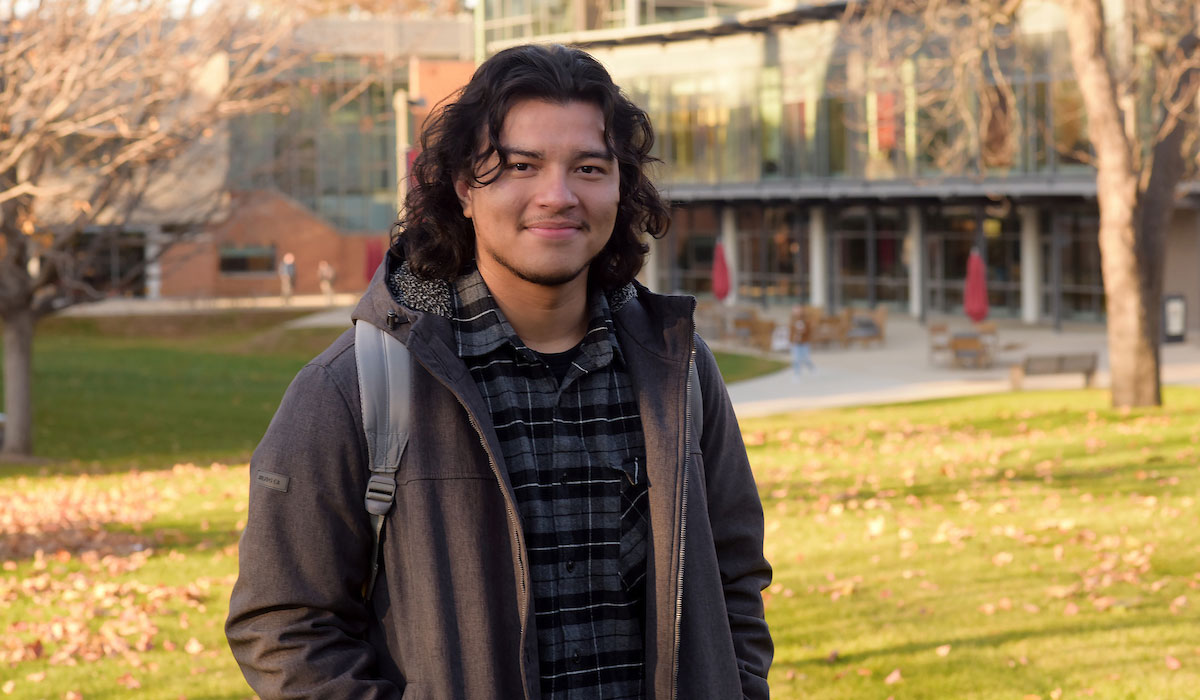

Senior José Castellón Gutiérrez remembers only bits and pieces of his cross-continental journey to the United States. Nine years old at the time, Castellón Gutiérrez made the trip from El Salvador with his older brother and an uncle in 2008, mostly traveling by car or bus. They were meeting his parents, who had migrated to the United States several years earlier.
“I think they wanted to come to the United States after starting a family in El Salvador because they wanted to provide us with the opportunities they didn't have,” Castellón Gutiérrez says. “I don’t really remember much about the trip itself, and it’s very surreal thinking about it now, leaving home and then traveling through these unknown parts of the world, sometimes without a guide.”
“I have a voice and I have to be willing to use it in order for things to change.”
After Castellón Gutiérrez and his brother crossed the border on foot, they were placed in a detention center and then released to a foster family in Arizona. They lived with that family for a month until their father could come and retrieve them. Their uncle was deported.
“It was summertime, around July, and I think we went to summer school while we were living there,” Castellón Gutiérrez says. “We learned a bit of English, which we didn’t speak at all.”
Thanks in part to the guidance of his father, Castellón Gutiérrez was soon able to learn English and develop a love of history. Growing up, he and his father would watch the History channel together. His interest grew stronger in high school when he took AP courses in World History and U.S. History.
Thanks to his classes with History professors Julia Young and Lev Weitz, and Media Studies Professor Niki Akhavan, Castellón Gutiérrez says he has a better understanding of the ways history affects current events in Latin America and the Middle East. He’s become especially interested in learning about the ways film and music reflect historical events.
“I took a class with Dr. Akhavan on media and the Middle East, and it gave me a different way of looking at media in general,” Castellón Gutiérrez says. “I’ve used those skills across different classes I’ve taken in my studies, including music in the Middle East and in Latin America. I’ve learned music can be a historical source and can speak to what was happening during a particular time period.”
One of Castellón Gutiérrez’s historical interests is learning more about groups of people who are often marginalized in our contemporary society, including Muslims and Latin Americans. In addition to his history major, he is pursuing three minors, each related to various cultures around the world: Islamic World Studies, French and Francophone Studies, and Latin American and Latino Studies. In the future, he hopes to pursue a doctoral degree in Latin American Studies.
“It’s really important to look deeper into their histories beyond the surface level of what we might hear about in the news,” he says. “I think a lack of knowledge of history can be really dangerous.”
Through internships and volunteer work with a nonprofit called Learning Life and with the Smithsonian Folklife Festival, Castellón Gutiérrez has developed a rich appreciation for intercultural exchange. Now he wants to share his experiences and perspective as an advocate for other undocumented immigrants.
This fall, Castellón Gutiérrez was one of three students from area Catholic colleges to participate in a discussion panel entitled “Undocumented and Unafraid” that was hosted by the nonprofit Faith in Public Life. As part of the discussion, Castellón Gutiérrez shared his personal story and spoke about the challenges he faces as an undocumented person unsure of what his future holds.
“I decided to do the panel because I have a voice and I have to be willing to use it in order for things to change,” Castellón Gutiérrez says. “Some people in our country don’t have the opportunity to hear stories like mine and learn what it’s like to be an immigrant.
“I can’t expect things to change by themselves and I want to be one of the reasons why people change their minds about who immigrants are, who they can be, what they look like, and what they can do.”
— Katie Bahr, Assistant Director of Media Relations and Communications. Bahr can be reached at bahr@cua.edu.
Learn more about Catholic University's departments of History and Media and Communication Studies.
Also, read Catholic University's statement of welcome for immigrants.